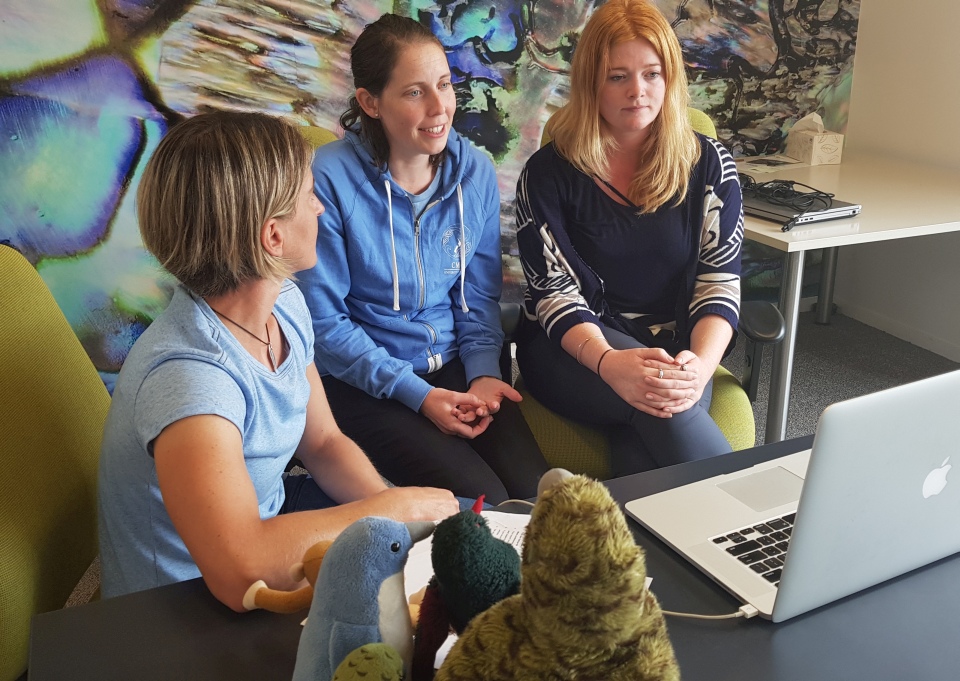Web conferences with schools are hosted live from the field by the LEARNZ Teacher and are coordinated by the LEARNZ Office. More about web conferences.
To book as a speaking school, email Shelley the LEARNZ Teacher shelley.hersey@core-ed.org.
| Web conference date |
Time |
Location; Where are you? |
Topic |
Experts |
Speaking Schools |
Recording |
| Tuesday 5 March |
9.15am |
Nelson |
The importance of marine ecosystems and how they work |
Rebecca McMullin and Clara Schlieman
|
Ngatimoti School, Year 4-6 |
Replay at https://vimeo.com/321342109 (40 minutes - the password is in your teacher's MyLEARNZ). Scroll down for questions. |
| Wednesday 6 March |
9.15am |
Nelson |
Estuaries, human impacts and tipping points |
Dana Clark, Regan Fairlie and Sam Thomas
|
Seatoun School, Year 7-8 |
Replay at https://vimeo.com/321589155 (41 minutes - the password is in your teacher's MyLEARNZ). Scroll down for questions. |
| Thursday 7 March |
9.15am |
Nelson |
Sustainable Seas Challenge and reducing marine plastic pollution |
Heni Unwin and Ross Vennell
|
Sancta Maria Catholic Primary School, Year 4-5 |
Replay at https://vimeo.com/321847833 (34 minutes - the password is in your teacher's MyLEARNZ). Scroll down for questions. |
Questions for Web Conference #1 from Ngatimoti School
- Arabella – Tell us about the species of seaweed found in New Zealand.
- Eloise – Can you estimate how many different types of ecosystems there are in the world? How do scientists know about them?
- Phoebe – What do animals need or do to survive in marine ecosystems?
- Chico and Nikau – Tell us about the most common type of marine ecosystem in New Zealand.
- Kalahni & Ruby – What is the largest marine ecosystem in the world and why is it so big?
- Denys & Alex A – What do the animals eat in our local marine ecosystems?
- Sultan & Kaisami – How many species of animals live in the sea overall do you think?
- Haze – What can harm marine ecosystems?
- Jack – What could totally destroy a marine ecosystem?
- Sayla – Why are marine systems so important to us? Why should we look after them?
Questions for Web Conference #2 from Seatoun School
- What are the major groups of animals or biodiversity living in the sea in summer where you are?
- Is there a great difference between the animals you would find in a marine reserve near Wellington and where you are?
- What are the visible signs of human impact in the sea where you are? Do boats or jetskis bring anything good to the area?
- How have some of the organisms evolved to cope with both biotic and abiotic factors changing over the last 150-350 years?
- Is there a noticeable change due to climate change to the sea near you?
- How is sea different to ocean?
- What made you interested to work with the sea and the environment?
- Are there many sharks and do you see signs of them migrating north as it gets colder?
- Has there ever been a rāhui on the Wellington coastline and did it show growth in the biodiversity in the years after it?
- Has tourism helped or caused more problems to the sea ? Has population growth affected the use of the sea in the area?
Questions for Web Conference #3 from Sancta Maria Catholic School
- Is plastic pollution a threat everywhere in the world?
- How does plastic destroy the marine environment?
- Is plastic pollution the biggest threat to our marine environment?
- How much plastic or pollution is there in our oceans?
- How long does it take for plastic to break down?
- When an animal eats plastic how long does it have to live?
- What ways have you seen plastic affect the marine environment?
- How does plastic pollution get to our marine environments?
- What can we do to stop plastic pollution?
- What species of marine creatures are most severely threatened by plastic pollution?
